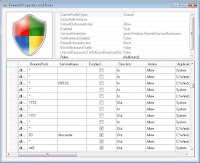Protecting your personal information has become an increasing necessity as the number of sites that require personal information increase. There are an increasing number of sites that you can purchase things on and an increasing number of sites that have
spyware, adware, malware and viruses. All of these can result in your information being transmitted through the
internet to third party companies or you can end up losing your data due to crashes.
A
firewall security software application is going to provide you protection against a wide variety of things. Primarily, a firewall is going to limit the access programs have from your computer to the internet. This is to prevent your personal information from being transmitted to the originator of the spyware, adware, or virus that was implanted onto your computer, it also prevents your programs from updating automatically. As a result, it becomes necessary to manually rather than automatically update your programs.
Firewall security software also provides you with protection while you are online. It helps you to prevent sites from accessing your computer while you are surfing the internet. There are many different types of websites including websites you may visit on a daily basis that attempt to access your computer. A firewall security software application can provide you with an added level of security.
There are some things to consider when using a firewall security program. You need to carefully monitor the settings of the software in order to ensure that you do not end up blocked from accessing the internet completely. It is one of the major complaints with firewall applications. They can also block any site, which uses connections such as streaming video sites, download sites, and file storage sites.
The necessity of these programs, however, cannot be denied, there are an increasing number of sites, which can create an issue with firewalls, and there are a number of different levels of control that the firewall can be set at depending on the type that you get. You can go with the most basic firewall security software, which is found in later versions of
windows. This does not offer a great deal of flexibility when it comes to setting up permissions and monitoring activity.
There is a variety of different firewall security software applications. There are also firewall applications that come with internet security suites as well as standalone applications. They also have a wide spectrum of features that allow you to provide a great deal of flexibility. Firewalls can also help to provide you with privacy and help to block certain types of sites. On most firewalls there are options to block particular sites and can further help with parental controls to help to protect your family.
There are a number of different types of firewalls. Some are just basic applications others are more complex however, they all have one thing in common they are designed to limit the access your computer has to the internet and to limit the access the internet has to your computer.






